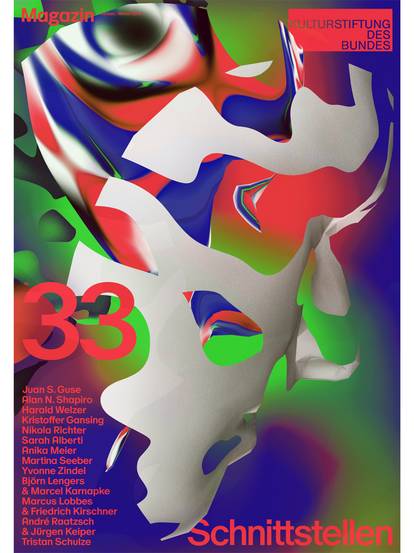We are pretty useless as shamans, but a few smaller and larger ecstasies would do our society good
01 The ecstatics and us
Although we may be fascinated by foreign cultures with their colourful dances, their trances, their rituals of drug use or collective sexuality as exemplary practitioners and bearers of ecstatic states, we – as members of capitalistic industrial societies – are not entirely unfamiliar with ecstasy. We think we know what ecstasy is, based on experiences with sexuality and drugs, Carnival, Oktoberfest or company parties; the “fever of the game” which football teams can succumb to, or the boisterous and oftentimes violent displays of enthusiasm and excess by the viewers; the psychological effects of endogenous substances released after long-distance races or high-risk sports like white-water rafting, rock climbing and bungee jumping, or walking over burning coals during a weekend seminar for managers, or even when fasting; at certain moments of professional activity, the so-called “flow” that stockbrokers experience, or the creative or writing raptures of artists and writers. And even though European observers at the turn of the 20th century, who saw themselves as representing a “hot” culture focused on the written word, may have been appalled, horrified or even disgusted by such collective dance ecstasies in many foreign cultures, our own Western culture – especially after World War II, as the media theorist Marshall McLuhan points out – had “cooled down” and “retribalised”. In many ways, it has since appropriated the practices of tribal cultures – for example, the loud, mass exercises of self-oblivion exhibited in collective dance practices at discos and techno parties in Western metropolitan cities.
Of course, we haven’t been able to appropriate everything that regularly occurs in foreign cultures; or perhaps never sought to appropriate it in the first place, such as “speaking in tongues” (so-called “glossolalia”), manic visions or auditory sensations, physical convulsions, epileptic-like seizures, obsessions or compulsions, e.g. in response to having one’s love spurned, dancing oneself to death like the young aborigine in Nicolas Roeg’s wonderful film Walkabout. We encounter such phenomena, if at all, in the psychiatric ward or during psychoanalysis. We regard such symptoms as unpleasant and those who exhibit them as requiring therapy. For most of us, it is questionable or difficult to imagine that other cultures that deliberately elicit these in collective situations find such states sensual or sensible.
02 Outside of where?
Cultural theory struggles to explain what exactly comprises ecstasy. Etymologically, the word means “standing outside” or “put out of place”, which begs the question – outside of where? Or where out of place?
If we define ecstasy, as some writers are wont to do, as a “loss of control over oneself”, we might be reading too much into the definition. We would have to regard a typical fit of rage, jealousy, laughter, the excessive need to share information, seducibility, or the consumption of more wine than our thirst requires as “ecstatic” behaviour. On the other hand, the same definition doesn’t seem broad enough either. For some ecstatic states do not necessarily consist of “losing” something. Just think of Spinoza’s well-known example of sleepwalkers, i.e. the fact that they “can do many things asleep which they would never dare in a waking state,” demonstrates “that the body itself by adhering to the laws of nature is capable of accomplishing many things one’s own mind would be amazed at.” If someone is outside of herself, or bereft of her – conscious – control, it doesn’t necessarily mean that she is mindlessly perambulating. It is more likely that other systems have assumed control, the existence of which we are little aware and whose ability to conduct certain tasks may even exceed the known systems. Sigmund Freud posited that the telling of a good joke requires the subconscious to process the conscious material for a brief moment; this insight offers us a familiar, mild example of this kind of superior ability of a different psychic system for certain tasks.
We run into similar difficulties if we attempt to define ecstasy as “thought and behaviour which deviate from predominant notions of a society or group and are viewed as strange or abnormal”. Again, this definition is too broad because, for example, at an American university, it could apply to the expression of controversial arguments or even wearing high-heeled shoes. On the other hand, this definition fails to account for the distinct characteristic of ecstasy by which it differs from other forms of deviant or pathological behaviour. Especially in cultures that we presume are most practised in ecstasy, ecstatic behaviour might be regarded as special, but by no means “abnormal” (in the sense of criminological or clinical definitions); and furthermore, it does not differ from the prevalent attitudes of the respective society or group. In contrast to our culture which views such behaviour as an individual pathology, the cultural notions and social roles (such as that of the shaman) in other cultures view ecstasy as an intentional and socially “acceptable” behaviour.
Perhaps we should view both as two sides of one coin – that ecstasy enables people to achieve things that would hardly be possible in ordinary circumstances, and that in some cultures and in some situations, ecstasy represents an intended, even desired, behaviour. We could then say: people might be capable of something extraordinary because the society or group desires it of them or because they recognise it as something valuable. (An example of the shift from an “ecstasy-friendly” to an “ecstasy-hostile” attitude in our culture is the discussion often heard in the 1980s of whether social democracy needs new visions, or whether people who have visions need to see a doctor). The ecstatics in such cultures would be “outside” themselves, yet inside the group. In effect, ecstasy forms an “inner outside” in such cultures.
03 Ecstatic cults and cults of avoidance
What we have here is a difference between cultures like ours which demand an extensive degree of self-control from individuals, and those that not only demand less self-control, but actually demand the opposite, namely to set aside self-control for something considered more worthwhile. The difference between the condemnation and the appreciation of ecstasy, therefore, is not one of rationality versus irrationality, but to a greater degree, one between conscious, individual self-control and less conscious, collective self-control. If people become less ecstatic, they don’t become more rational – they only become more stubborn and less inclined to support the common good. Max Weber’s argument that the “disenchantment of the world” is not a process of the Enlightenment, but rather one of fanatic religious internalisation, points exactly in this direction.
Along the same line, Michel Leiris and Georges Bataille tried to salvage the “sanctity of everyday life” in the 1930s and reclaim it for the political left. From a leftist perspective, they argued that it was essential to occasionally interrupt one’s mundane, goal-oriented routines that secure one’s existence in order to enjoy moments of celebration, generosity and wasting time, money, sleep, etc. Not only does this make people proud, independent beings who fear living a bad life more than death, but also strengthens their sense of solidarity, enabling them to see other people’s happiness as their own.
The line of demarcation defined by the French theorists of the Sacré quotidien seems astoundingly topical today. It points out a series of cultural micro-conflicts, e.g. whether or not to wish “Gesundheit” to someone who sneezes, or whether one should compliment a female colleague on her new hairdo or rather pretend not to notice at all. “Positive cults” in which individuals are encouraged to take initiative and be more generous, more elegant and friendlier than they might normally be, stands in contrast to “negative cults” of avoidance. Leiris, Bataille and their colleagues and comrades-in-arms from Contre-attaque and the Collège de sociologie du sacré would have known what was at stake here and taken sides. And not for what is erroneously purported to be reason or “civilisational process”, but rather for the small and greater ecstasies – the positive cults of sociability and self-determination.

![[Translate to English:] Magazine 38](/fileadmin/_processed_/f/1/csm_Magazin38_Cover-Vorschau_921x1230_689f428dc3.jpg)
![[Translate to English:] Magazine 37](/fileadmin/_processed_/b/c/csm_Mag37_Cover-Vorschau_921x1230_b5129fdb2a.jpg)
![[Translate to English:] Magazine 36](/fileadmin/_processed_/2/a/csm_Cover_Magazin36__issuu_2f3cef97bb.jpg)





![[Translate to English:] Magazine 30](/fileadmin/_processed_/c/b/csm_magazin30_vorschau_9005f773d3.jpg)














